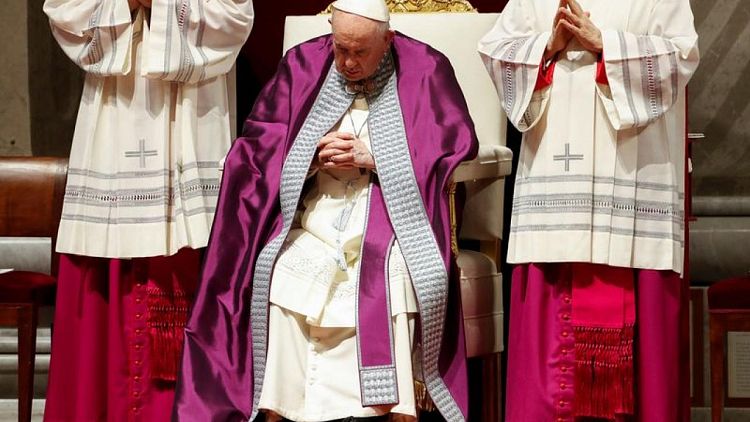By Philip Pullella
VATICAN CITY - Pope Francis led the world's Catholic bishops on Friday in praying for peace between Russia and Ukraine, saying the world had forgotten the tragedies of the 20th century and was still menaced by nuclear war.
Francis presided at a service in St. Peter's Basilica in which he entrusted the protection of all humanity, "especially Russia and Ukraine," to Mary, who Christians believe is the Mother of God and who can intercede with him in heaven.
At about the same time, thousands of bishops in cathedrals and chapels around the world were reading the same prayer in local languages, resulting in one of the most precisely coordinated global Church event in living memory.
In a separate homily before reciting the prayer, Francis spoke of "scenes of death" in which "bombs are destroying the homes of many of our defenceless Ukrainian brothers and sisters" and of "a cruel and senseless war that threatens our world".
Both the Ukrainian and Russian ambassadors to the Vatican attended, sitting on separate sides of the aisle.
Since Russia invaded its neighbour on Feb. 24 in what it calls a "special military operation", the pope has implicitly criticised Moscow, strongly condemning what he has called an "unjustified aggression" and denouncing "atrocities," but he had not mentioned Russia by name.
He used the words Russia and Russians on Friday, albeit as part of a prayer and a homily.
"We have forgotten the lesson learned from the tragedies of the last century, the sacrifice of the millions who fell in two world wars ... we have closed ourselves in nationalist interests," the pope said in the prayer, whose formal title was "An Act of Consecration to the Immaculate Heart of Mary".
The act denounced the stockpiling of weapons, the destruction of the environment, greed and the spread of abortion. It asked Mary to "eliminate hatred and the thirst for revenge, and teach us forgiveness, free us from war, protect our world from the menace of nuclear weapons".
Archbishop Visvaldas Kulbokas, the Vatican ambassador who has remained in Ukraine since Russia launched its invasion last month, said before Friday's event he would read the prayer from a makeshift altar in a kitchen in a safe room in the embassy in Kyiv.
LINK WITH FATIMA
In the Portuguese town of Fatima, papal envoy Cardinal Konrad Krajewski, one of the pope's closest aides, read the same prayer near the spot where Mary is said to have appeared repeatedly in 1917 to three shepherd children.
The link with Fatima is essential to understanding the religious and political significance of Friday's consecration.
The Church says that in the apparition of July 13, 1917, Mary asked that Russia be consecrated to her, otherwise it would "spread her errors throughout the world, causing wars and persecutions of the Church" and that "various nations will be annihilated".
After the 1917 Russian revolution and during the Cold War between the West and the Soviet Union, the "Message of Fatima" became a rallying point for anti-communism in Christianity.
Similar acts of consecration of the world were performed by past popes in 1942, 1952, 1964, 1981, 1982 and 1984.
The pope's decision to carry out Friday's consecration was welcomed by some Church traditionalists who generally oppose Francis. They say some or all of the previous consecrations may not have been valid because they did not adhere precisely to Mary's instructions to the visionary children.
